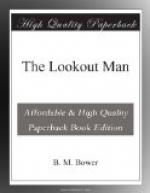“Why, no—” Marion’s smile became set and superficial. “I do wish you’d teach me, Mr. Brown.”
“Well, come on over here and I’ll show yuh somethin’.” He reached over and laid his hand on her arm, and after an involuntarily shrinking, Marion thought it wisest to let it pass. Very likely he did not mean anything at all beyond eagerness to show her the tracks. Why in the world had they forgotten to be careful, she wondered. But it was hard to remember that this wilderness was not really so untrodden as it looked when she and Jack found themselves alone in some remote spot. She went fearfully, with uneasy laughter, where Hank led. They stopped beside the tree where she and Jack had talked the other day. Hank pointed down at the telltale snow.
“It’s dead easy to read tracks,” he drawled, “when they’s fresh and plain as what these are. They’s four cigarette butts, even, to show how long the feller stood here talkin’ to the girl. And behind the tree it’s all tromped up, where he waited fer her to come, most likely. You kin see where his tracks comes right out from behind the tree to the place where they stood talkin’. An’ behind the tree there ain’t no cigarette butts a-tall—an’ that’s when a feller most generally smokes—when he’s passin’ the time waitin’ fer somebody. An’ here’s a string—like as if it had been pulled offn a package an’ throwed away. An’ over there on that bush is the paper the string was tied aroun’—wind blowed it over there, I guess.” He waded through the snow to where the paper had lodged, and picked it up. “It’s even got a pos’mark onto it,” he announced, “and part of the address. It must a’been quite a sizable package, ’cause it took foteen cents to send it from Los Angeles to Miss Marion—”
“Why, what do you know about that!” cried Marion abruptly, bringing her hands together animatedly. “All that’s left of my opera fudge that one of the girls sent me!” She took the paper and glanced at it ruefully. “I remember now—that was the time Fred was sure he’d get a—” she stopped herself and looked at him archly—“a jack-rabbit. And I said I’d come out and help him carry it home. But he didn’t have any luck at all—why, of course, I remember! Meeting the professor with the mail, and bringing the candy along to eat if we got hungry—and we did too. And Fred hid behind the tree and scared me—why, Mr. Brown, I think you’re perfectly wonderful, to figure that all out just from the tracks! I should think you’d be a detective. I’m sure there isn’t a detective in the country that could beat you—really, they are stupid alongside of such work as this. But I hope the tracks won’t tell you what Fred said about not getting the—er—the rabbit he shot at!” She laughed up into his face. “You might tell,” she accused him playfully, “and get us all into trouble. I’m awfully afraid of you, Mr. Brown. I am really.”
Hank Brown could read tracks fairly well, but he could not read women at all. His puzzled gaze went from Marion’s laughing face to the tracks in the snow; from there to the paper in his hand; to the tree, and back again to her face.




